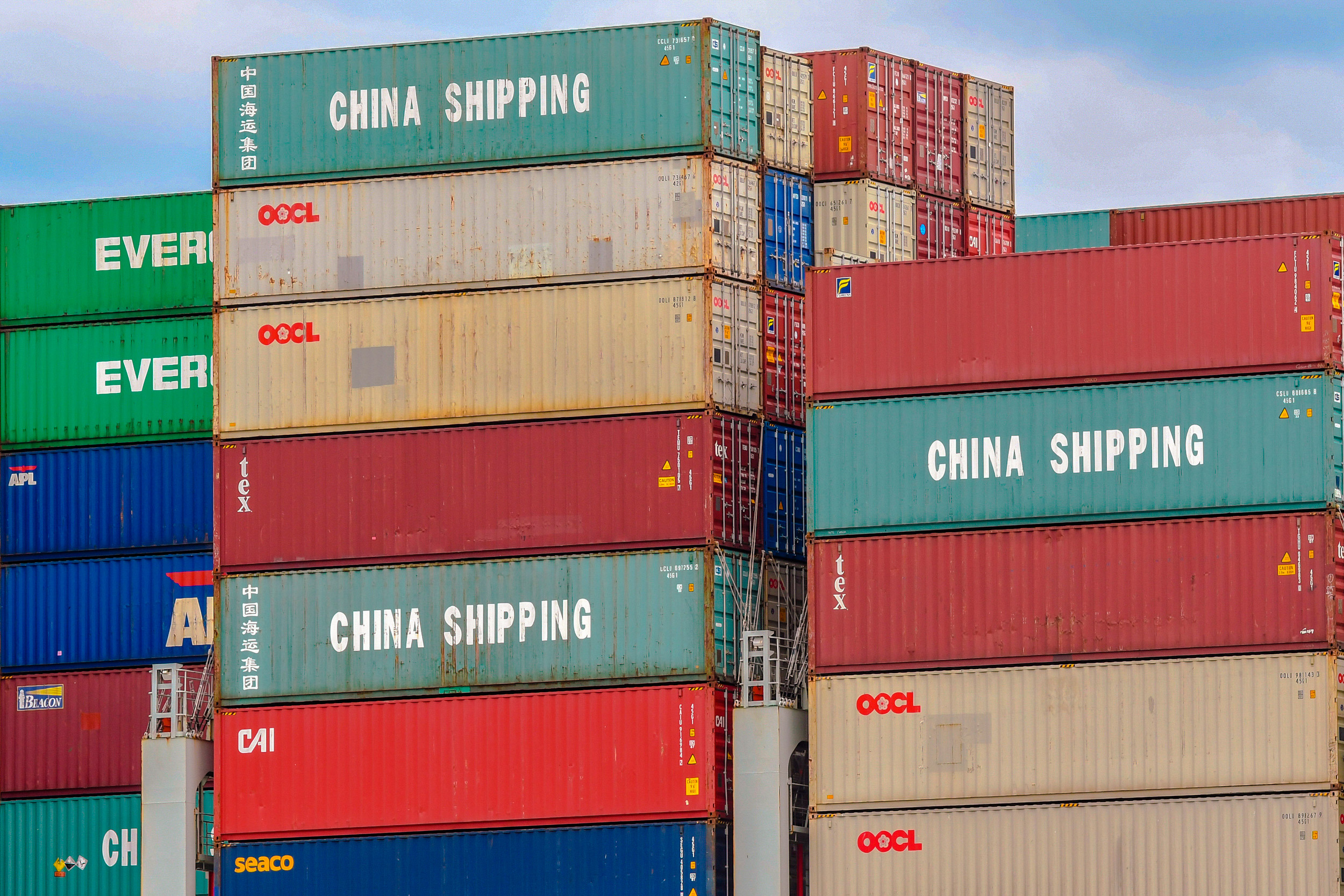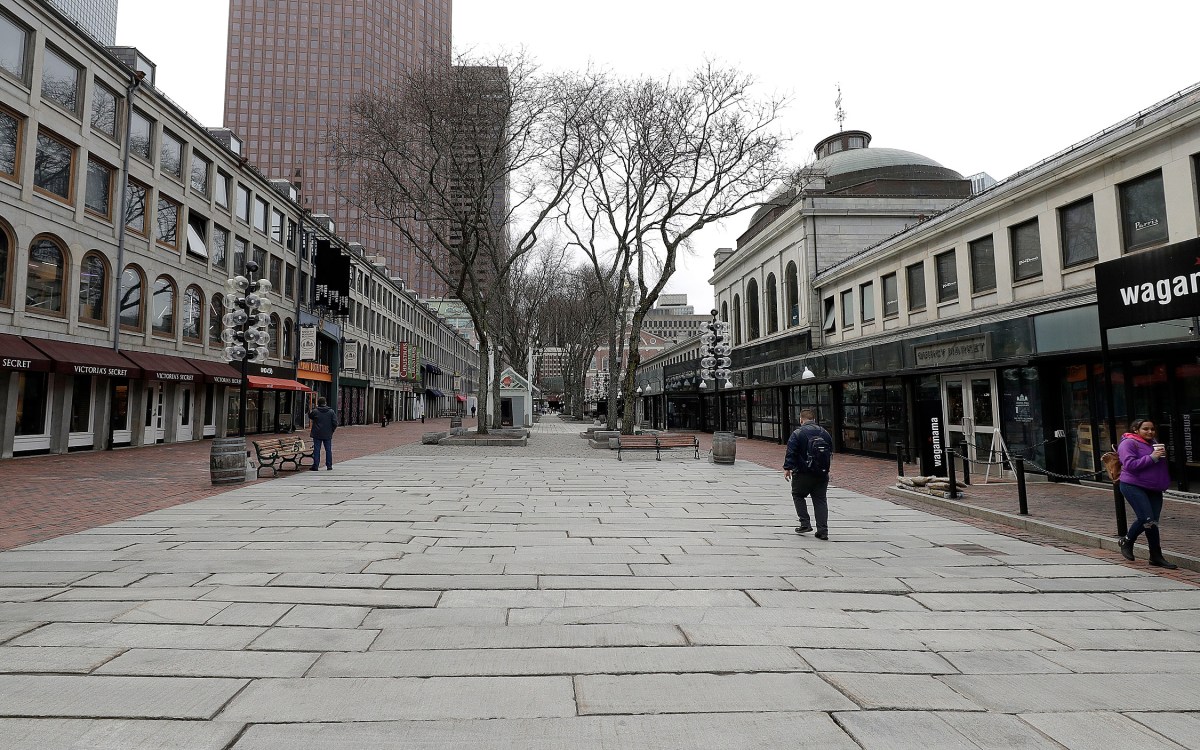
Winfried Rothermel/picture-alliance/dpa/AP Images
Coronavirus economic fallout won’t be ‘done with by June’
Business School’s Shih sees ‘tough slog’ ahead for workers, small businesses, and various industries
This is part of our Coronavirus Update series, in which Harvard specialists in epidemiology, infectious disease, economics, politics, and other disciplines offer insights into what the latest developments in the COVID-19 outbreak may bring.
With stock markets plummeting despite the federal government’s recent steps to try to bolster the economy, worries that COVID-19 could do lasting economic damage are rising. The Gazette spoke with Harvard Business School’s Willy Shih, the Robert and Jane Cizik Professor of Management Practice, about lessons learned from China, which appears to have wrestled the epidemic there under control — reporting just a handful of new cases daily — and where people and companies are slowly getting back to work.
Q&A
Willy Shih
GAZETTE: As the epidemic wanes in China and rises here, what are you seeing about COVID-19’s economic impact?
SHIH: I think there will be a dawning realization that we are depriving an awful lot of people of income, especially contract employees, seasonal employees, restaurant employees, hotel, airlines, and stuff like that. We saw this happen in China. All these service employees, restaurants, hotels, airlines, entertainment venues, all those people didn’t have work and didn’t have the income to drive any consumption. That’s a huge problem. Also, in China a lot more businesses run on a cash basis. If they run out of cash, they go out of business or they don’t have the ability to stay open. For service businesses that’s a huge problem, but there are also small suppliers and supply chains for maybe third-, fourth-, fifth-tier suppliers. If small suppliers make a critical component and they go out of business, that’s a whole different set of problems and that eventually catches up to companies here. What’s ironic is that China is getting back to business and we go from the “supply shock” that we saw early in the pandemic — and which is still unfolding because of transportation delays — but as they sort out that supply shock, we run into the “demand shock” as the economy slows on our side and on the European side.
GAZETTE: So China is starting to try to get back to work?
SHIH: They are. Most of the big manufacturers are probably up to 80 percent or 90 percent. But anytime you stop a giant supply-chain machine with all these moving parts, getting everything going again and coordinated is difficult. When the factories started up, a lot of them were shorthanded, and then there was a shortage of truck drivers. If you think of how much material moves in and out of these factories all the time, sorting out all those transportation logistics — just getting enough truck drivers to get containers in the right place — is a challenge. Farther down the logistics chain, maybe 10 days ago, there was a big problem in the ports of Los Angeles and Long Beach because there had been so many so-called “blank sailings” from Asia. Blank sailing is the industry euphemism for “Hey, we’re not going to run a ship on that line because we don’t have any cargo.” There was a decrease in ships coming into Los Angeles and Long Beach, so there was nobody to take the empty containers from prior trips back. So the empty containers were sitting there blocking export traffic. They didn’t have anywhere to put them. Finally, a couple of the big shipping lines sent some of their mega ships just to take the empties back. So you have this coordination problem, and everything is out of balance. In normal times, this really is a well-oiled machine. All these interlocking pieces all work together. When you stop everything and try to start it up again, they start at different rates, and everything is out of coordination until people can rebalance everything.
“When you buy the five-year supply [of toilet paper], that hurts people who don’t have a lot of income and run their lives on a cash basis. They buy small quantities when they need it. It’s the well-to-do who can go to Costco and buy a pallet load of toilet paper.”
GAZETTE: Is it more difficult if everyone’s not at the same place in the cycle? We’re still shutting down.
SHIH: We’re still shutting down, and we’ll probably see more shutdowns. U.S. factories that relied on Asia for components are getting their last shipments about now, as they work through the distribution centers. At some point, they’re going to run out of inventory, and then there’ll be a lot of supply surprises because you only need to be short one part to shut down an auto assembly line. Meanwhile you’ll also see demand collapsing, with so many contract workers and gig employees suddenly losing their income. That takes a lot of purchasing power out of the economy and starts hitting demand — unless you’re talking about toilet paper.
GAZETTE: I want to ask you about toilet paper because, like many people, I’ve been wondering why everyone is hoarding toilet paper.
SHIH: I wrote this piece in Forbes about COVID-19, shortage gaming, and the toilet-paper supply chain. Demand for toilet paper is flat. It’s not as if there’s seasonal demand for toilet paper. Therefore, if you’re a manufacturer, what you do is optimize your supply chain for stable demand. So then there’s this panic. Fear is driving it and that creates shortages, which creates even more fear. People are saying, “I’m going to be stuck for two weeks, four weeks.” But you don’t need a five-year supply. When you buy the five-year supply, that hurts people who don’t have a lot of income and run their lives on a cash basis. They buy small quantities when they need it. It’s the well-to-do who can go to Costco and buy a pallet load of toilet paper.
GAZETTE: When we talk about fear, we’re seeing rising concern about the economy, with the S&P 500 and the Dow closing down about 12 percent Monday. How much of this is fear versus an understanding of what is going to be a certain amount of economic disruption? To what extent is this a reasonable reaction to what’s going on?
SHIH: It’s hard to give a precise answer. Obviously, it’s a combination. For example, if you look at Harvard University and many other universities, there’s what I think of as a very considered response. We haven’t had the national leadership in terms of getting out ahead of this, when we had four weeks of warning. But you see a lot of institutions saying, “OK, we have to try not to overload the health care system, so let’s make everybody work from home. Let’s enhance this social distancing.” So closing down the NBA and theaters and things like that enhance social distancing, and that will help us spread out the contagion so that the health care system can handle it. Amazon and Microsoft and Google and large employers instituted work from home pretty early. That necessarily will have economic impact, and I think everybody understands that, but the No. 1 thing we have to avoid as a country is having a health care system that is forced to make choices about who it can save and who it can’t save.
GAZETTE: Has anyone thought about how many small businesses may not have the cushion to weather the storm? Bankruptcies are going to occur because of this. Has anybody put a number on that?
SHIH: I haven’t seen it. I know there are people in Washington who are worried about it. We already saw this in China. This is going to be a problem here, with restaurants, all kinds of small businesses, small shops, and so on. If you have no revenue coming in and you have to cover your expenses, that’s a problem. A lot of firms will feel compelled to conserve cash by laying off people. The airlines have a huge dilemma now. American is parking their entire widebody fleet. Companies like that are trying to preserve cash and employment, payroll, is a big part of it. But if you put them on furlough, there’s a percentage of the American public that doesn’t have even a small cushion to make it through an emergency. That’s something we really have to worry about. This is going to be a tough time. It’s the cash problem I’m worried about right now.
GAZETTE: You started to mention small businesses in China. Do we know what the impact has been?
SHIH: I have to rely on reports coming out of there because there isn’t much travel back and forth, but you see a lot of reports about restaurants, small vendors, just out of cash right now. I was talking to a student about a family business that has a factory in China. We were talking about cash accounting and he said, “You know, I go to them and they don’t have a lot of details on all their costs.” I said, “Well, a lot of these businesses look at how much cash comes in every month and how much cash goes out. And, as long as the cash in is more than the cash out, then I’m OK.” But when you have these dramatic cuts in cash in, especially the small shops, the restaurants and things like that, I think it’s a gigantic problem over there.
GAZETTE: Are there any lessons that we can apply here?
SHIH: There was a lot of criticism about how China suppressed the early reports and wasted some critical weeks early on. You could say we did the same thing in this country in different ways. From an economic standpoint, I think one of the things that companies are going to need to do is think about supply-chain diversity and supplier risk. If you think about how global supply chains are structured right now, we think about lean manufacturing and really not having a lot of inventory on hand, because inventory costs you money. There’s always the assumption that logistics are efficient, and I can move all this stuff around when I need it.
“If you think having a lot of risk in China is bad, it’s really hard to diversify away from that, because China is such a large source and has such an efficient manufacturing system.”
GAZETTE:: But aren’t there people out there who view these kinds of events as simply rare and unpredictable?
SHIH: People talk about “black swan” events, that are not supposed to happen very often. But if you look at the last decade, we had the 2008‒2009 downturn. We had the earthquake and tsunami in Japan; we had the flooding in Thailand; we had the trade war with China. I don’t know that black swan is the right name because they occur more often than we would assume. I would argue that the risk of those black swan events has not been priced into people’s cost assumptions. People tend to ignore it right now. We should understand our supplier network a little bit better. Most companies have difficulty understanding who is deep in their supply chain. So, for example, I know who my first-tier suppliers are; they are the ones who supply me directly. But those suppliers have their own suppliers, and those suppliers have what to me are my third-tier suppliers. And it’ll cascade down. Most companies don’t know who their suppliers are beyond the second tier. So you end up with something happening to a third- or fourth-tier supplier that shuts you down. What we should learn from this is to understand our supply chain and then ask whether we should be diversifying our risk a little bit more. But I predict once this blows over we’ll go back to how things were, because, frankly, if you want to diversify, it’s going to be more expensive. If you think having a lot of risk in China is bad, it’s really hard to diversify away from that, because China is such a large source and has such an efficient manufacturing system.
GAZETTE: What about lessons for individuals, those who might be laid off?
SHIH: In China, we did see companies lending employees to others. We’re going to have a lot of people without work. In China, you saw a lot of people ended up taking delivery jobs because delivery rose, all of a sudden. I think there will be other surprises. Harvard has gone online, so we’ll probably find that online education really evolves a lot. I wrote a case a number of years ago, after the east Japan earthquake and tsunami. There was a Sony factory in that area that was the sole supplier of SRW format digital videotape, which all the Hollywood studios used for their mastering. So there was a shortage of SRW tape, and the studios said, “We have to go to the archives and erase some of this tape so we can use it.” But that drove the technology to so-called “file-based mastering.” It’s like they said, “Wait a minute. I don’t need to store it on tape. I’ll just store it on a disk drive.” And that that was one of the things that helped the transition to digital cinema. So we’re going to see a lot of things like that. Already, in the Seattle area, more people are getting comfortable with online delivery of groceries, especially older people who don’t tend to do that. They think, “I guess I’ll try it,” and find out, “Hey, this isn’t so bad.” We’ll see a bunch of those.
GAZETTE: What do they say? Necessity is the mother of invention?
SHIH: Or something a contact at the Gates Foundation said, “Never waste a good crisis.” Use this crisis to drive different forms of behavior. I think we’ll find some surprising things.
GAZETTE: What are you looking for in the next days and weeks that are potentially important indicators of the impact of COVID-19 on the economy?
SHIH: The critical thing will be once the infection rates stop this exponential climb. Everybody’s looking for that, the inflection point in the curve. That’ll tell us when we can start planning for the recovery. Until that point, I worry that the economic damage is going to be quite significant. Like I said earlier, we had the supply shock, and it’s getting sorted out. We’ll have this wave of catch-up supply arriving on our shores just in time to meet this demand shock. Getting those things back in sync is going to take a while. It’s not going to be something that we’re done with by June. It’s going to take longer than that. A lot of the airlines have reduced their flights through the summer, peak travel season. So that tells me that there are a lot of people who realize getting back to business as usual is going to take some time. We’ve got a tough slog ahead.






